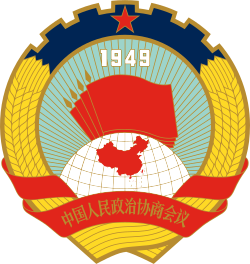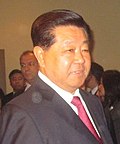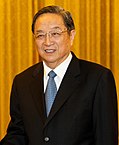| Chairman of National Committee of the Chinese People's Political Consultative Conference | |
|---|---|
| 中国人民政治协商会议 全国委员会主席 | |
 | |
| National Committee of the Chinese People's Political Consultative Conference | |
| Type | Presiding officer |
| Status | National-level official |
| Member of | Standing Committee of the National Committee Chairperson's Council |
| Nominator | Presidium of the Plenary Session of the National Committee (chosen within the Chinese Communist Party) |
| Appointer | Plenary Session of the National Committee |
| Term length | Five years, renewable |
| Constituting instrument | Charter of the CPPCC |
| Inaugural holder | Mao Zedong |
| Formation | 9 October 1949 |
| Deputy | Vice Chairpersons Secretary-General |
| Salary | CN¥150,000 per annum est. (2015) [1] |
| Chairperson of the National Committee of the Chinese People's Political Consultative Conference | |||||||
|---|---|---|---|---|---|---|---|
| Simplified Chinese | 中国人民政治协商会议全国委员会主席 | ||||||
| |||||||
| Alternative Chinese name | |||||||
| Simplified Chinese | 全国政协主席 | ||||||
| |||||||
 |
|---|
The Chairman of the National Committee of the Chinese People's Political Consultative Conference is the leader of the National Committee of the Chinese People's Political Consultative Conference (CPPCC), which is a political advisory body in the People's Republic of China.
Contents
The chairman is officially nominated within the CPPCC National Committee and approved by a plenary session of the National Committee. The chairman is a member of the Standing Committee of the National Committee, which handles the regular affairs of the body, and presides over its work. The chairman is also a member of the Chairperson's Council, which handles the day-to-day affairs of the Standing Committee. The chairman is assisted in their work by vice chairpersons and the secretary-general of the National Committee. [2] The chairman is usually the leader of the united front system of the Chinese Communist Party (CCP), being the head of the principal forum for united front work. [3]
Since its establishment, all CPPCC chairpersons have been a member of the Politburo Standing Committee of the CCP except during transition periods, being at least its 4th-ranking member. [4] The incumbent chairman is Wang Huning, who is the 4th-ranking member of the PSC.














